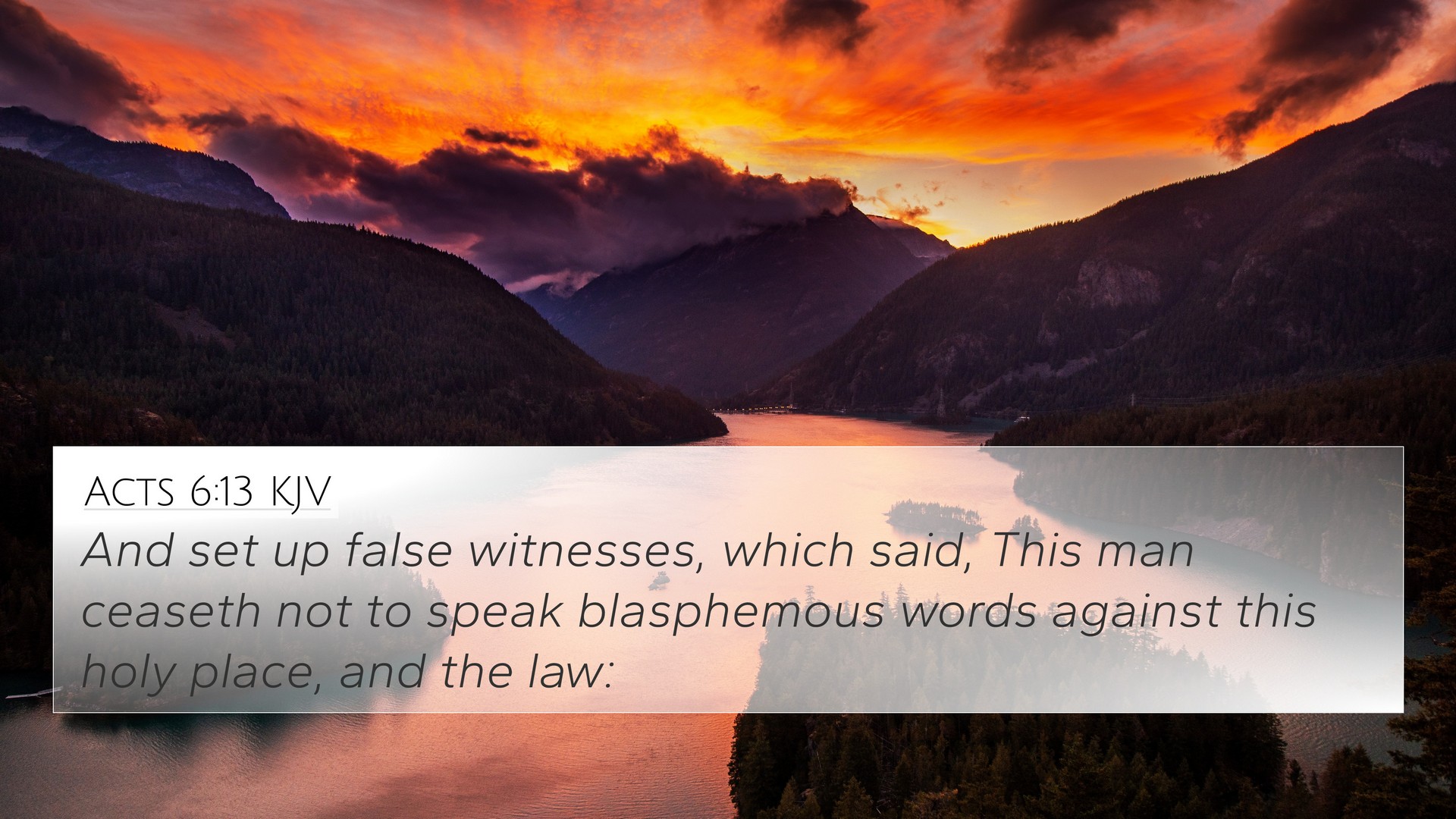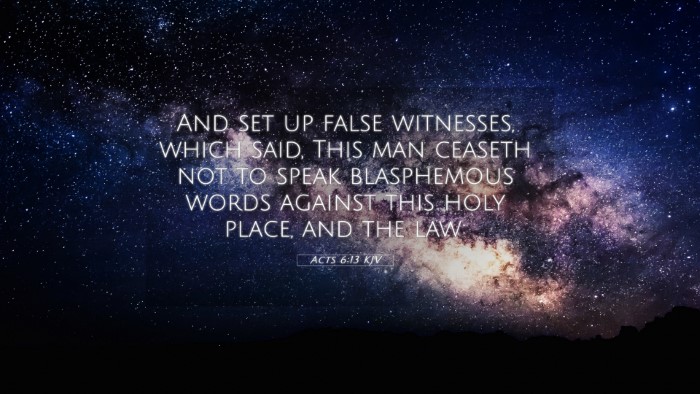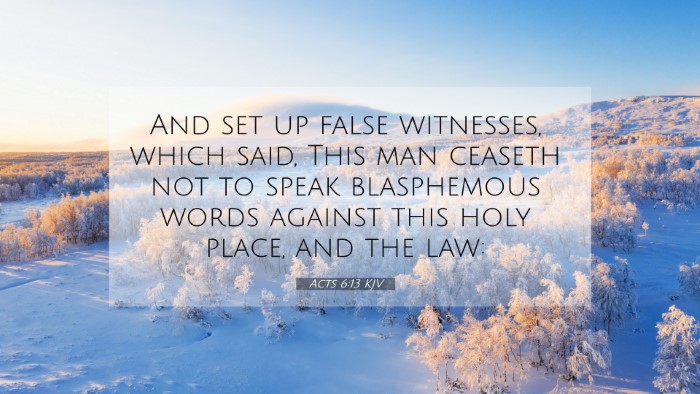Old Testament
Genesis Exodus Leviticus Numbers Deuteronomy Joshua Judges Ruth 1 Samuel 2 Samuel 1 Kings 2 Kings 1 Chronicles 2 Chronicles Ezra Nehemiah Esther Job Psalms Proverbs Ecclesiastes Song of Solomon Isaiah Jeremiah Lamentations Ezekiel Daniel Hosea Joel Amos Obadiah Jonah Micah Nahum Habakkuk Zephaniah Haggai Zechariah MalachiActs 6:13 Similar Verses
Acts 6:13 Cross References
And set up false witnesses, which said, This man ceaseth not to speak blasphemous words against this holy place, and the law:
Uncover the Rich Themes and Topics of This Bible Verse
Listed below are the Bible themes associated with Acts 6:13. We invite you to explore each theme to gain deeper insights into the Scriptures.
Acts 6:13 Cross Reference Verses
This section features a detailed cross-reference designed to enrich your understanding of the Scriptures. Below, you will find carefully selected verses that echo the themes and teachings related to Acts 6:13 KJV. Click on any image to explore detailed analyses of related Bible verses and uncover deeper theological insights.

Acts 6:11 (KJV) »
Then they suborned men, which said, We have heard him speak blasphemous words against Moses, and against God.

Acts 21:28 (KJV) »
Crying out, Men of Israel, help: This is the man, that teacheth all men every where against the people, and the law, and this place: and further brought Greeks also into the temple, and hath polluted this holy place.

Psalms 27:12 (KJV) »
Deliver me not over unto the will of mine enemies: for false witnesses are risen up against me, and such as breathe out cruelty.
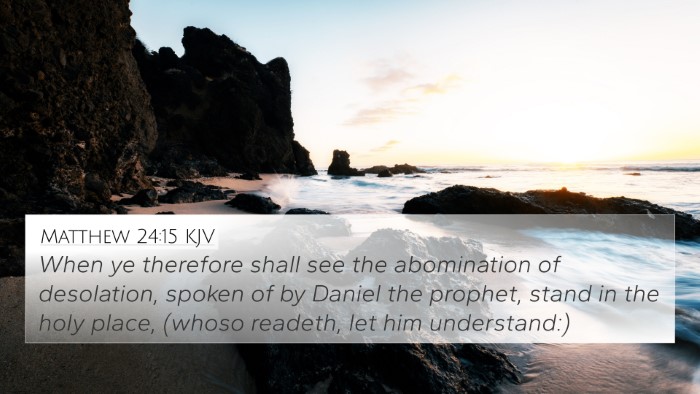
Matthew 24:15 (KJV) »
When ye therefore shall see the abomination of desolation, spoken of by Daniel the prophet, stand in the holy place, (whoso readeth, let him understand:)
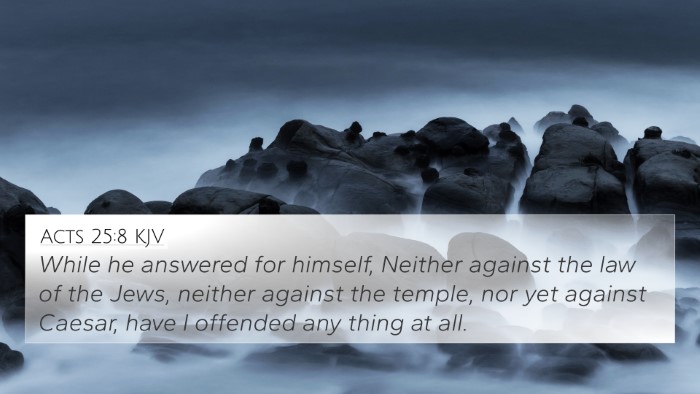
Acts 25:8 (KJV) »
While he answered for himself, Neither against the law of the Jews, neither against the temple, nor yet against Caesar, have I offended any thing at all.

Acts 7:58 (KJV) »
And cast him out of the city, and stoned him: and the witnesses laid down their clothes at a young man's feet, whose name was Saul.
Acts 6:13 Verse Analysis and Similar Verses
Understanding Acts 6:13
Acts 6:13 states: "They set up false witnesses, who said, 'This man never ceases to speak words against this holy place and the law.'" This verse recounts the accusations made against Stephen, one of the first deacons in the church, highlighting the theme of persecution that early Christians faced.
Contextual Overview
In this passage, we see how Stephen, after performing wonders and signs among the people, became the target of envy and false testimony. The narrative sits in the larger context of Acts, where the growth of the early Church is both a source of joy and contention. Stephen's unwavering faith and the subsequent conflict with established religious authorities provide a poignant insight into the challenges faced by the early believers.
Commentary Insights
- Matthew Henry's Commentary: Henry emphasizes the unjust nature of Stephen's accusation. He points out that such distortions of truth are common when divine work threatens the status quo. This reflects the greater spiritual battle between the light of truth and the darkness of falsehood.
- Albert Barnes' Notes: Barnes analyzes the significance of this event as a precursor to the martyrdom of Stephen. He reflects on the character of false witnesses, noting that they operated under religious jealousy and the fear of losing influence.
- Adam Clarke's Commentary: Clarke delves into the role of the witnesses, drawing parallels with the trials of Jesus, where false testimonies were similarly levied. He suggests that Stephen's words likely challenged foundational beliefs that some clung to concerning the temple and law.
Thematic Connections
This verse is rich with themes that resonate throughout other portions of the Bible:
- Persecution for Faith: The experience of false accusations is mirrored in Matthew 5:11-12, where Jesus blesses those who are reviled for the sake of righteousness.
- Witnesses for God: The notion of being a true witness is essential in understanding God's ongoing testimony through the Church, as seen in Revelation 12:11 where believers overcome by the blood of the Lamb and the word of their testimony.
- Jesus’ Trial: The parallels with Christ’s own trial before the Sanhedrin are critical, highlighted in Matthew 26:60-61 where false witnesses were also called against Him.
- Occupy Until He Comes: The call for faithful witnessing against adversity extends to Luke 19:13, where the servants are instructed to manage their master's business until his return.
Cross-References
Acts 6:13 directly correlates with several other scripture passages, providing a rich tapestry of inter-Biblical dialogue:
- Mark 14:56 - Witnesses against Jesus had similar false testimonies.
- John 7:12 - The division created by Jesus’s teachings leads to accusations from religious authorities.
- Acts 7:58 - The eventual stoning of Stephen is a direct consequence of these accusations, highlighting the extreme measure of falsehood.
- 1 Peter 2:12 - Believers are called to live honorably even when accused of wrongdoing.
- Acts 5:28 - The Apostles faced similar complaints against their teachings.
- Matthew 10:17-18 - Jesus foretells the disciples being delivered into councils, echoing Stephen's experience.
- Luke 21:12 - The promise of divine assistance during persecution resonates with Stephen’s faithfulness in the face of falsehood.
Application for Today
Acts 6:13 serves as both a historical account and a motivating reminder for contemporary believers. It illustrates that speaking the truth of God may lead to adversity and opposition. However, it encourages believers to stand firm in their faith, knowing they join a long line of faithful witnesses who endure for the sake of righteousness.
Conclusion
In summary, Acts 6:13 not only provides insight into the life of Stephen and the early Church but also serves as a profound lesson on persecution, truth, and the steadfastness required of believers. The connections between this verse and other scriptural texts enrich the understanding of God's work and the trials faced by His followers. Through careful study and cross-referencing of varying Biblical texts, one can deepen their comprehension and appreciation of the continuous narrative woven throughout Scripture.
